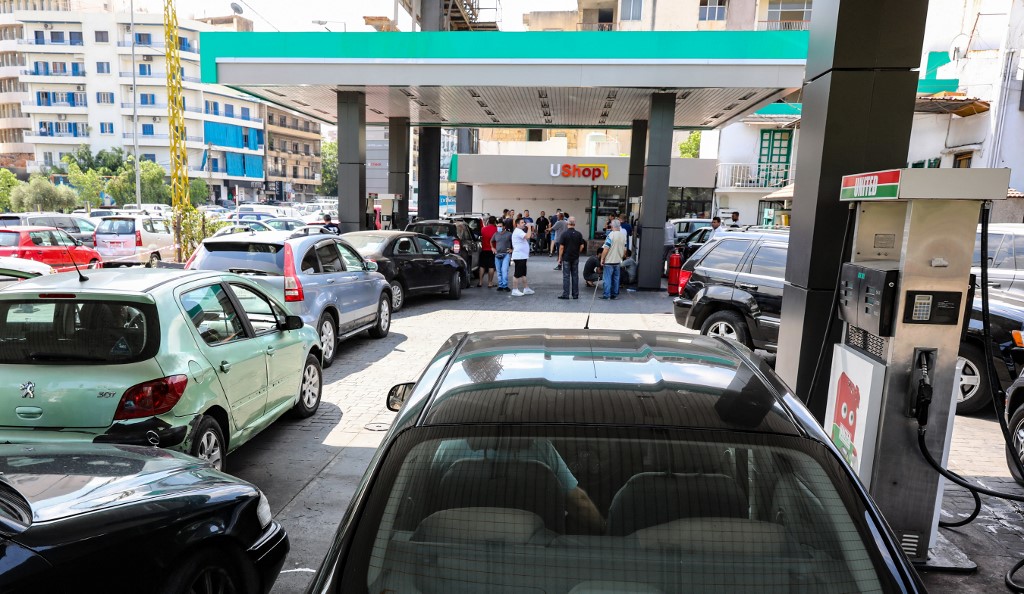Lebanon crisis: With Nasrallah's oil surprise, only Hezbollah is left standing

Outside my hotel in southern Beirut, there’s a petrol queue more than a mile long. Emotions run high in the burning heat of the day.
Many drivers have no petrol left. Every time the queue edges forward, they get out and push. Other cars sometimes try to barge in. That’s when angry confrontations and fights occur.
I walk down the queue talking to drivers. Some have lost their jobs. I ask how they plan to feed their families, and to pay for electricity, rent and water. They have no answers.
All the drivers in the petrol queue tell me of their utter contempt for the politicians who run their country
Even those lucky enough to keep their jobs are desperate. Fouad, a 50-year-old state employee, tells me how the currency crash has destroyed the value of his salary: “Before the crisis, I had $3,000 a month. It’s now $150.”
I ask how he can support his wife and three children, two of whom are in school. He throws his arms up in the air. “I don’t know. God help me!”
Fouad has been waiting four hours for petrol, and I’d guess there are another three or so hours to go.
Hopeless future
A prosperous-looking man in a polo shirt accosts me. He says: “I used to eat meat every day. Now I eat meat one day per month.”
He’s one of the luckier victims of Lebanon's economic disaster. Again and again, I hear the same story: no money, no job, no electricity. A hopeless future. And mounting, burning, inchoate rage against the Saudi- and US-backed government. One man shouts at me: “If I meet a minister, I will kill them.”
All the drivers in the petrol queue tell me of their utter contempt for the politicians who run their country. With Lebanon facing what the World Bank calls one of the worst economic crises since 1850, one of the most despised men in the country today is Prime Minister Najib Mikati.
He’s barely been in power six weeks, but the appointment of this billionaire businessman - hailed by Forbes as the richest man in Lebanon - was not popular. With Lebanon sinking into an economic and social morass, he’s seen as the representative of the morally bankrupt ruling elite who caused the crisis.
Perhaps only one man is disliked more: Riad Salameh, who has served as governor of Lebanon’s central bank since 1993, making him one of the world’s longest-serving bank governors. Once hailed as a financial magician, he’s now blamed by many for the current mess - and with so many losing their savings and their jobs, it’s not hard to see why.
With Lebanon in ruins, it’s become reasonable to ask whether the Lebanese financial and political model of the post-civil-war years - soft Saudi loans and hard US and European support - can survive. And reasonable to ask what replaces it.
Entrenched corruption
Elections scheduled for next spring may not help much. Lebanon’s confessional system, in which high offices of state are reserved for religious groups (the president must be a Maronite Christian, for example, and the prime minister a Sunni Muslim) was invented to avoid sectarian conflict. Today, it simply entrenches corruption and venality.
Karl Marx noted long ago that economics drives politics. If that’s correct, then many things must change if complete social and economic collapse is to be avoided in Lebanon.
Whether you like it or not - and many don’t - only one organisation has emerged stronger and more respected from the current catastrophe: Hezbollah. And only one major figure: Hezbollah Secretary General Hassan Nasrallah.
With the political system paralysed by the fuel crisis, Nasrallah acted to bring diesel oil into the country from Iran. At first he was mocked, but now the tankers have crossed the border overland from Syria into Lebanon.
The move has been denounced by Mikati as a “violation of Lebanese sovereignty”. Not many agree with him.
One man who had lost his job during the crisis told me: “I am Lebanese. I want to eat. I am grateful to anyone who can help.”
Worrying for the prime minister, even some sympathisers are saying the same thing. In an interview with Al Mayadeen, Cesar Maalouf, an MP for the pro-US and pro-Saudi Lebanese Forces party, thanked the “brotherly country” of Iran for “helping the Lebanese people” in their time of trouble. He explained: “We are all going hungry. We are all being humiliated today. If you have a problem with Hezbollah and its weapons, put this problem aside.”
New political landscape
Significantly, Maalouf also criticised a promise of fuel from US ambassador Dorothy Shea as “too little, too late”.
No wonder. Such is the scale of the crisis that the US has been obliged to give in to Hezbollah. It had no choice; Lebanon is in mortal need.
A new regional architecture is under construction at astonishing speed
Hezbollah made its disdainful move against the wishes of the Lebanese political establishment and the US. Because the oil was shipped via Syria, the purchase defied the Caesar Act, which sanctions the Syrian government.
Nasrallah’s audacity has paid off, presenting fresh evidence of a new political landscape swiftly emerging across the Middle East. Barely a month has passed since Kabul fell to the Taliban - but the consequences across the region are already momentous.
A new regional architecture is under construction at astonishing speed. And the drivers in the petrol queue are at last being offered a glimmer of hope.
The views expressed in this article belong to the author and do not necessarily reflect the editorial policy of Middle East Eye.



0 Comments:
Post a Comment
Subscribe to Post Comments [Atom]
<< Home